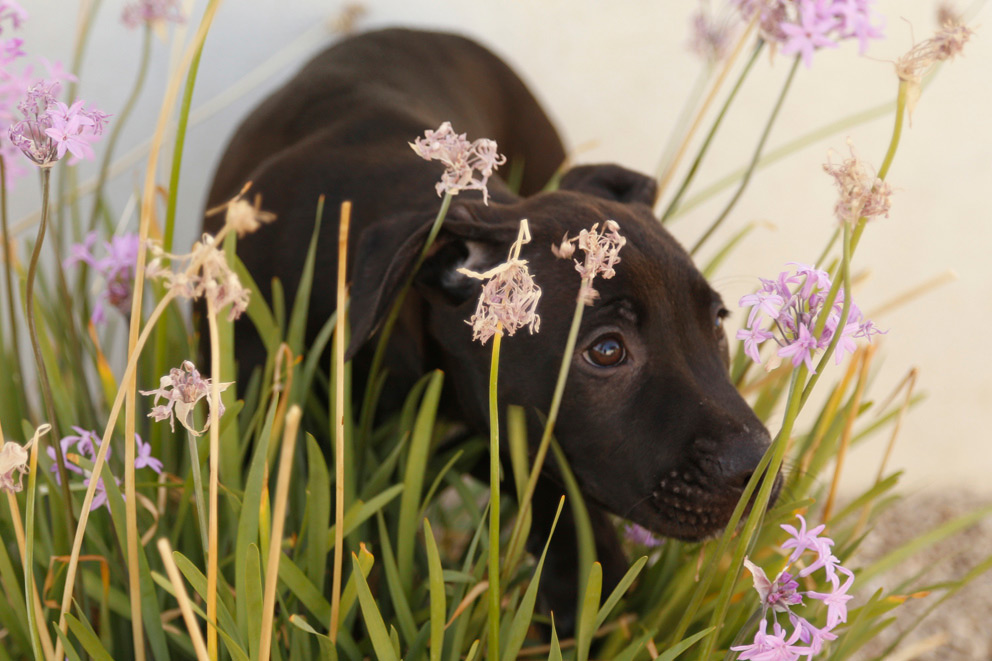Download this article as a PDF:
A puppy’s meal schedule must include three measured meals a day, preferably at the same time every day. At SCAN we are currently feeding the puppies 3 times a day and have just increased the quantity to 120 grams per feed, this is to compensate for the rate they are growing and also compensates for living in a Protectorate Environment
 The best time for your puppy’s first meal is around 7 - 8 a.m., noontime for lunch, and 5 - 6 p.m. for dinner.
The best time for your puppy’s first meal is around 7 - 8 a.m., noontime for lunch, and 5 - 6 p.m. for dinner.
The last meal should always be no later than 6 p.m. so that he will have ample time to digest his food and eliminate one last time before bedtime. Stick to this basic puppy feeding schedule until the puppy reaches 14 to 18 weeks old, at which point the meal schedule should change to two meals a day (unless your veterinarian suggests otherwise).
The meals should consist of a healthy and well-balanced diet that has been designed for puppies. This means refraining from cheaper dog foods that contains fillers and sugars rather than high quality nutrients. While these foods will make your dog appear to be full and satisfied, they are not giving your dog all the nutrition his growing body requires, and he may feel the need to eat more as he tries to meet those nutritional needs.
Lesser puppy foods can undoubtedly affect the long-term growth and overall health of your puppy as well as cause gastric upset, constipation or diarrhea, which makes house training that much more of a challenge.
To keep your puppy at healthy weight, make sure not to overfeed him even if he is begging for more. This is especially tricky with some breeds, who always appear to be hungry and who are predisposed to becoming overweight as a result. If you have any questions regarding exactly how much food your puppy should be eating in the course of a day, talk to your veterinarian rather than guess.
Do your research on the ingredients that go into different dog foods and how labels are written so that you can make the most informed choice on which puppy-formulated and adult dog food you will buy.
If your puppy appears to be reluctant about eating his food, you might try feeding him inside his crate so that he can eat without feeling threatened or distracted. This can also discourages him from eliminating right after he eats.
In addition, it is best to allow about fifteen minutes to pass after giving the puppy water before you take him outside to eliminate. Of course, you will need to be patient during the learning process and be ready to take him outside again if it appears that he needs to eliminate again.
An Example of an Ideal Puppy Feeding Schedule
- 6:30 a.m. - wake up, quick exercise
- 7:00 a.m. - morning meal, outdoor walking, playtime then back to crate
- 10:00 a.m. - outdoor walking, bonding time with owner then back to crate
- 12:00 (noon) - midday meal
- 1:00 p.m. - outdoor walking, playtime then back to crate
- 5:00 p.m. - evening meal, outdoor walking, playtime
- 7:00 p.m. - short outdoor walk, playtime, then back to crate
- 9:00 p.m. - bedtime (in his crate or in your bedroom)
I stress this is IDEAL and due to your home schedule may not be possible, but try to include the elements above in your schedule, remember the the Puppy lives with you and will adjust to your daily routine, what is important is CONSISTENCY…dogs love a schedule.
In the first stages of house-training your puppy, it is best to take him outside to eliminate every 1.5 hours. Give him some water to drink about fifteen minutes before taking him outside. As the house-training progresses, the puppy will be able to last for longer intervals without feeling the need to eliminate.
Right before bedtime, after the puppy has eliminated outside, spend a few minutes playing gently with your puppy – nothing that will get him too excited. You are on your way with a well trained puppy that sleeps well all night.



